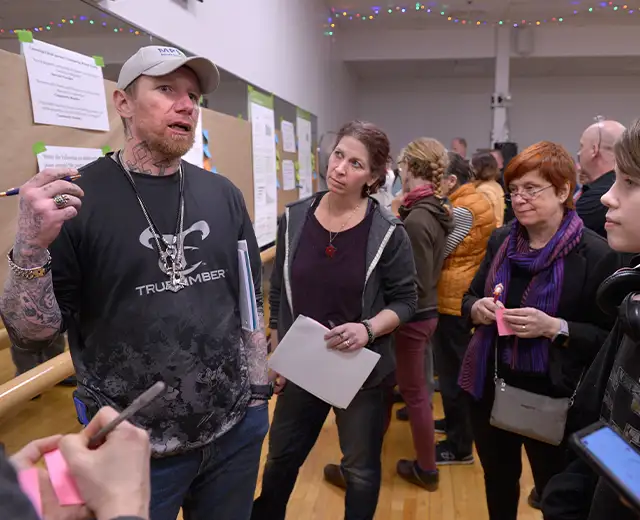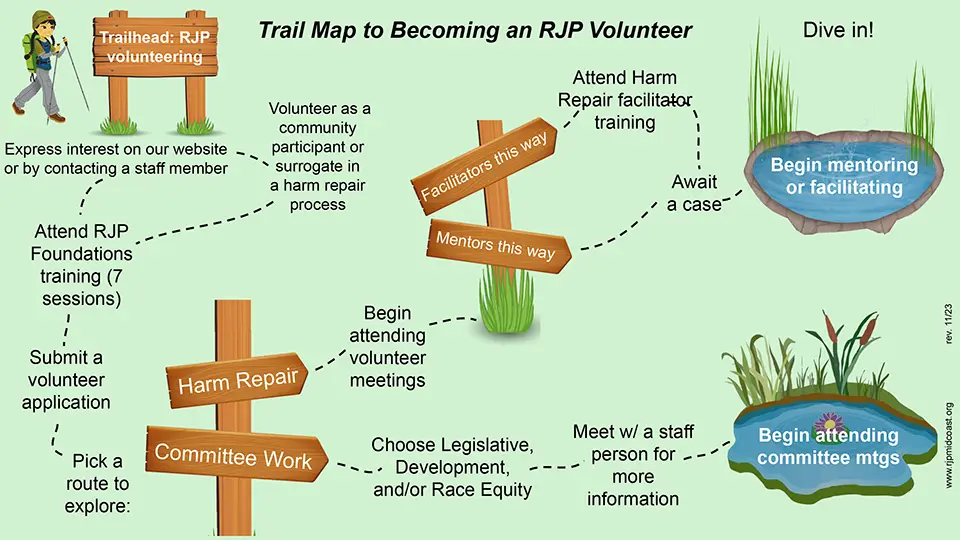Empower Change & Volunteer with the Restorative Justice Project Maine
At Restorative Justice Project Maine, we believe in the transformative power of community. Our volunteers play a crucial role not only in expanding our capacity, but also in broadening the knowledge and application of restorative justice in our communities.
Why Volunteer with Us?
Volunteering with us offers you the chance to make a significant difference in our community. Whether you’re mentoring a young person working through a harm repair process, facilitating a group discussion, or helping with administrative tasks, your contribution matters. What’s more: volunteering with us allows for flexibility; you can start in one role and transition into another based on your interests and the needs of the community.

Our volunteers are the heart of our organization. Here’s what some of them have to say about their experiences:
Volunteering with RJP [Maine] has allowed me to make a tangible difference in my community. It’s rewarding to see the positive impacts of restorative justice firsthand.
RJP Maine Volunteer Roles
We offer a variety of volunteer roles to suit different skill sets and interests. To get a better understanding of our roles, please review the descriptions below.
After getting a sense of our volunteer positions, fill out a volunteer form, and we’ll guide you through the next steps – like finding the right role for you and starting your volunteer training.

Volunteer Mentor
Volunteer Mentors provide support and accountability to participants in RJP Maine’s Harm Repair program. Mentors meet and communicate regularly with their mentee to assist with the completion of harm repair agreements, serve as a support, or engage in social activigites to build relationships and develop a mentee’s interests. Mentors attend their mentee’s harm repair circle, closing circle, and any additional harm repair processes that the facilitators decide are necessary for the participants. Above all, mentors are expected to serve as good role models and employ restorative relationship skills meant to amplify their mentees’ voice, autonomy, and dignity.
Volunteer Facilitator
Volunteer Harm Repair Facilitators create space for people impacted by an incident of harm to share their perspectives on what happened and how they were affected. They bring impacted parties together to make things right, and to prevent the harm from happening again. In coordination with an RJP case manager and/or another volunteer co-facilitator, they guide restorative processes including initial restorative reflections and subsequent circles. Facilitators meet regularly with their co-facilitator during the active phase of the case to collaborate on next steps that best meet the needs of the parties involved.
Transform Lives & Communities With Us
Volunteering with Restorative Justice Project Maine is an opportunity to contribute to a cause that promotes healing, understanding, and community-building. It’s a chance to be part of a movement that seeks to transform the traditional criminal legal system into one that’s truly restorative. Join us today and make a difference!
As a mentor, I’ve learned just as much from my mentee as they have from me. It’s a truly enriching experience.
VOLUNTEERS ARE INVALUABLE!
Below Jake Denham, a former youth participant in RJP Maine’s Community Conferencing Program.
Jake talks about his amazing mentors ⬇
Check it out! Jake, on why mentoring is so important ⬇
